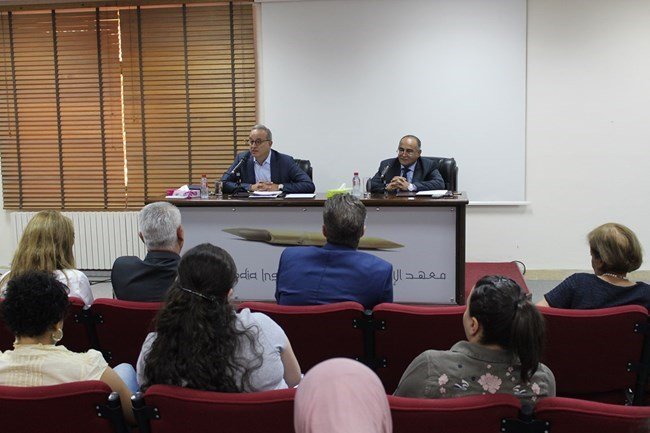Image:

08 Jul 2017
Marwan Muasher, vice president for studies at Carnegie Endowment for International Peace, has affirmed that the stage of so-called "Arab Spring" is not over yet and that the Arabs are not ready to face the next stage. This is because the causes of the Arab revolutions over the past six years are still present. As a matter of fact, the authoritarian trend has aggravated, in addition to monopoly of power, lack of social justice, failure of economic policies, and the lack of a modern concept of civil state and equal citizenship. <br />
<br />
Muasher, who assumed senior posts in the state, delivered a lecture at the Jordan Media Institute (JMI), moderated by JMI Dean Dr. Basim Tweissi, on the future of political reform and opportunities for democratic transformation in the Arab world. He said that His Majesty King Abdullah II had drawn up a broad outline for building a modern and democratic civil state through a number of discussion papers published over the span of two years. His Majesty the King elaborated on his concept of building a modern democratic state through some broad frameworks that he had identified.<br />
<br />
He added: Today, we are in a situation whereby His Majesty has offered a reform vision par excellence. However, at best, it is not being translated by the executive authority, while it is opposed by influential persons in power on many occasions. <br />
<br />
Muasher pointed out that most secular and religious forces have asserted their commitment to a civil state, but this assertion does not mean anything if it is not accompanied by commitment to a democratic civil state. This entails commitment to peaceful rotation of power under the umbrella of His Majesty the King. No one may monopolize power. Only ballot boxes can reflect the will of the people. This requires that secular forces be ready for this.<br />
<br />
He said that the prevailing social contracts in many countries of the region had expired. These contracts were adopted between the authority and the people by coercion, and not through negotiation or consensus. He pointed out that these contracts are made up of two main parts: The first says that the state is committed to providing basic services to the citizens in return for the commitment of the citizens to the second part of the contract, which is accepting the lack of political representation in running the affairs of their countries or having weak or symbolic representation. <br />
<br />
He added that these contracts remained active despite their coercive nature. However, when governments grew larger in a rentier, and not productive, manner, the state became unable to maintain the same level of services offered to the citizens. The state insisted on not giving people an appropriate voice to achieve self-determination. The Arab revolutions were the direct result of this flaw. He indicated that modern technology expedited these revolutions by making information about the world easily accessible, especially for the new generation. This is in addition to easy communication and networking between people.<br />
<br />
He said that the Arab region is currently facing a new upheaval, which is the imminent end of the oil era. There has been a drop in oil prices, and global projections say that prices would remain low in the foreseeable future. Oil-producing countries and those benefiting from its revenues, either through financial assistance or the remittances of workers in these countries, are no longer able to finance rentier systems that do not rely on productivity and that cannot face the challenge of providing real job opportunities for young societies, which send millions to the labor market annually. He indicated that the main challenge here is that it is impossible to keep the old rentier system, besides the difficulty of shifting toward productive systems, especially given the lack of the political will to achieve this. <br />
<br />
He said: Perhaps, this analysis can lead us to a forward-looking view of a safe and prosperous future. If the authoritarian trend is the main cause of Arab revolutions, the need for good governance and inclusive regimes appears to be visible. If the rentier systems are unable to continue, then a gradual and smooth transition toward productive systems seems self-evident. <br />
<br />
He added that these two shifts are hard to achieve because the majority of Arab ruling regimes do not wish to give up a part of their power in favor of strengthening the legislative and judicial authorities despite the manifest failure of these regimes to develop their societies. <br />
<br />
He said that there is a pressing need for new social contracts that guarantee the fundamental rights of all segments of society. They should also guarantee that none of them encroaches on the others. This can only be through strong foundations of a civil state to be negotiated and agreed on between all components of the one society itself, and not only between the state and the people.<br />
<br />
Muasher, who occupied the post of senior vice president of external affairs at the World Bank, added that any process of political reform that does not aim at preventing the domination of any authority over the other authorities remains part of cosmetic reforms, which do not provide the foundation stone of building institutions that protect democracy and lead to real stability and prosperity.<br />
<br />
At the end of the lecture, which is within the program of guest lecturers hosted by the JMI, including opinion leaders, decision-makers, and prominent journalists, who provide their own vision of a number of topics, Muasher answered questions by the attendees. <br />



